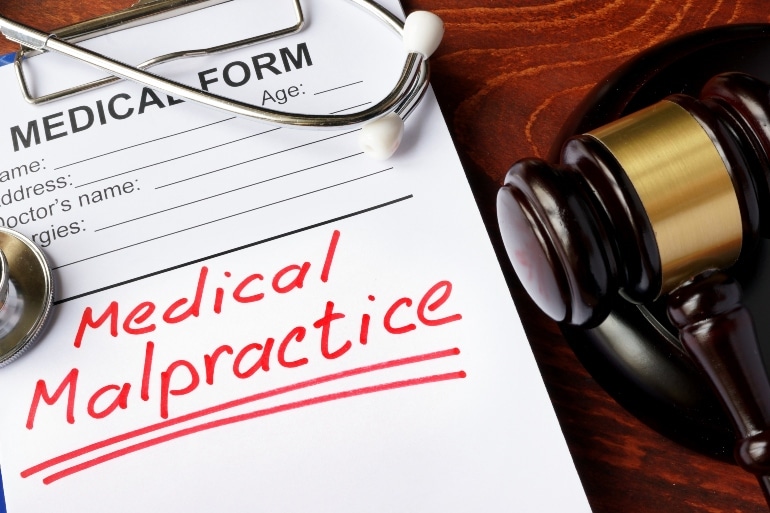MEDICAL MALPRACTICE LAWYERS
If you've experienced injury or injustice at the hands of a negligent medical practitioner, contact The Sam Bernstein Law Firm to get the compensation you deserve.
MICHIGAN MEDICAL MALPRACTICE LAWYERS
Don't delay in recovering the benefits you deserve.
Medical malpractice is when a doctor makes a mistake that causes you or a loved one serious harm. Legally, medical malpractice has occurred when a doctor fails to comply with a reasonable standard of care. When someone who is not a doctor makes a mistake, he or she is often said to have acted negligently. Malpractice is simply negligence applied to healthcare professionals. Tragically, a doctor’s mistake can have severe, or even deadly, consequences for a trusting patient. This is when you should contact Michigan's most experienced personal injury law firm!
The Institute of Medicine reported that estimated deaths caused by medical malpractice and errors are as high as 98,000 a year.
MAKING A MEDICAL MALPRACTICE CLAIM
In Michigan, a patient has the right to file a lawsuit against any physician or hospital, which may have committed malpractice. However, the filing requirements for a malpractice lawsuit are lengthy and complicated. These requirements include an "affidavit of merit". This in turn in certifies medical experts that there is evidence that you were the victim of malpractice.
Usually, a malpractice claim must be filed within two years of the date of the malpractice incident, or 6 months from the date of discovery that malpractice occurred. Although the law provides additional time for certain protected groups, these exceptions are limited.
The laws governing malpractice suits may be the most complex of all Michigan’s personal injury laws. Moreover, the Michigan Supreme Court strictly interprets malpractice law. This includes the sections governing the "affidavit of merit" and the absolute deadline for filing a malpractice claim.
Failure to meet these legal requirements means that the victim loses all rights to file a lawsuit against the medical professional or hospital which negligently caused severe injury — or even death.
MORE INFORMATION ON MEDICAL MALPRACTICE:
WHAT IS MEDICAL MALPRACTICE?
Some forms of medical malpractice are unmistakable, like performing surgery on the wrong body part, the wrong patient, or administering the wrong medication.
Most types of malpractice may not be obvious. For example, if an individual was not warned about the serious risk of a particular treatment or if treatment unexpectedly causes a horrible injury, malpractice may have occurred.
In general, an individual may have a medical malpractice claim when a doctor or other medical professional failed to provide proper treatment and the incorrect treatment caused the patient to suffer a new injury. The law requires evidence of new injury, because it would be unreasonable to hold the healthcare professional responsible for the original medical problem.
Some examples of medical malpractice include:
- Failure to diagnose a medical condition
- Misdiagnosis of a medical condition
- Failure to treat a patient’s medical condition properly
- Failure to administer anesthesia safely
- Failure to manage a pregnancy or deliver a baby in a safe manner. See our Birth Injuries section for more information on these types of malpractices
- Failure of a nurse or other staff member to keep a treating physician informed of a patient’s condition
- Failure to administer medications properly
- Failure to protect a patient from a fall or other injury on hospital property
If you or a family member is a victim of medical malpractice, contact us immediately.
THE PATIENT BILL OF RIGHTS
Federal laws and regulations govern many aspects of the health care system. In Michigan, state laws provide some additional protection. Even these laws do not go far enough, because a patient cannot file a legal claim to protect his or her rights, before suffering serious physical injury.
The Michigan law, MCL 333.20201, known as the Patient Bill of Rights provides that a patient or resident of a health care facility have, at a minimum, the following rights.
A PATIENT OR RESIDENT HAS THE RIGHT:
- To not be denied appropriate care based on race, religion, color, national origin, sex, age, disability, marital status, sexual preference, or source of payment
- To inspect, or receive for a reasonable fee, a copy of his or her medical record upon request. A third party shall not be given a copy of the person’s medical record without prior authorization of that individual
- To confidential treatment of personal and medical records
- To refuse release of personal and medical records to a person outside the health facility or agency, except as required because of a transfer to another health care facility or as required by law or third party payment contract
- To privacy, to the extent feasible, in treatment and in caring for personal needs with consideration, respect, and full recognition of his or her dignity and individuality
- To receive adequate and appropriate care
- To receive, from the appropriate individual within the health facility or agency, information about his or her medical condition, proposed course of treatment, and prospects for recovery, in terms that the patient or resident can understand, unless medically contradicted as documented by the attending physician in the medical record
- To refuse treatment to the extent provided by law and to be informed of the consequences of that refusal. If a refusal of treatment prevents a health facility or agency or its staff from providing appropriate care according to ethical and professional standards, the relationship with the patient or resident may be terminated upon reasonable notice
- To exercise his or her rights as a patient or resident and as a citizen, and present grievances or recommend changes in policies and services on behalf of himself or herself or others to the health facility or agency staff, to governmental officials, or to another person of his or her choice within or outside the health facility or agency, free from restraint, interference, coercion, discrimination, or reprisal
- To receive information about the health facility’s or agency’s policies and procedures for initiation, review, and resolution of patient or resident complaints
- To receive information concerning an experimental procedure proposed as a part of his or her care and to refuse to participate in the experimental procedure without jeopardizing his or her continuing care
- To receive and examine an explanation of his or her bill regardless of the source of payment and to receive, upon request, information relating to financial assistance available through the health facility or agency
- To know who is responsible for and who is providing his or her direct care, to receive information concerning his or her continuing health needs and alternatives for meeting those needs, and to be involved in his or her discharge planning, if appropriate
- To associate and have private communications and consultations with his or her physician, attorney, or any other person of his or her choice
- To send and receive personal mail unopened on the same day it is received at the health facility or agency, unless medically contraindicated as documented by the attending physician in the medical record
- To exercise fully his or her civil and religious liberties, including the right to independent personal decisions and the right to knowledge of available choices. The health facility or agency shall encourage and assist in the fullest possible exercise of these rights
- To meet with, and participate in, the activities of social, religious, and community groups at his or her discretion, unless medically contradicted as documented by the attending physician in the medical record
- To be free from mental and physical abuse and from physical and chemical restraints, except those restraints authorized in writing by the attending physician for a specified and limited time or as are necessitated by an emergency to protect the patient or resident from injury to self or others, in which case the restraint may only be applied by a qualified professional who shall set forth in writing the circumstances requiring the use of restraints and who shall promptly report the action to the attending physician. In case of a chemical restraint, a physician shall be consulted within 24 hours after the commencement of the chemical restraint
- To be free from performing services for the health facility or agency that are not included for therapeutic purposes in the plan of care
- To receive the health facility or agency rules and regulations affecting patient or resident care and conduct
- To receive adequate and appropriate pain and symptom management as a basic and essential element of his or her medical treatment
If you or a family member is the victim of medical malpractice, contact us immediately.
HEALTH INSURANCE COVERAGE LAWS
Michigan law assures individuals the right to receive important information about their health insurance coverage. This law applies to state-regulated health insurance companies, health maintenance organizations (HMO), preferred provider organizations (PPO), and Blue Cross Blue Shield of Michigan.
A HEALTH INSURER MUST PROVIDE PERSONS WHOM IT COVERS WITH THE FOLLOWING INFORMATION:
- Which services are included in the health care coverage plan?
- How much an individual patient will have to pay for services?
- Who can an individual call to file a complaint?
- How does the insurance plan handle coverage for emergencies?
- What happens if a person’s family physician no longer participates in that insurance plan?
- What happens if a person needs treatment while out of state or out of the covered service area?
If you did not get this information, you should contact your insurance company and ask for this important material. State law offers special protection to individuals covered by a health care plan that requires selection of a physician from an approved list of health professionals (i.e. most HMOs and similar plans).
A PERSON ENROLLED IN AN HMO, OR SIMILAR HEALTH PLAN, HAS THE RIGHT TO INFORMATION ABOUT:
- The qualifications of doctors available to provide treatment
- The services that require advance approval
- The coverage for prescription drugs
- The way that the health plan pays for services
Under the law, your HMO must provide you with the name, address, and phone number of a person to contact for more information about the issues listed above. If you do not know whom to contact, call the HMO and ask to be connected with someone who can give you further information.
You also should be aware of other state laws related to health care and health insurance coverage. A health insurance plan cannot ask a physician to sign a contract that stops that doctor from telling patients about all of their medical options and rights. Additionally, the insurance company must guarantee health coverage without pre-approval, if a patient has a medical emergency.
Finally, the Michigan law, MCL 550.1907-15, known as the Patient’s Right to Independent Review Act, provides an appeal process, if a health insurance company refuses to pay for necessary medical treatment that an individual believes should be covered.
THE PROCESS HAS THREE STEPS:
- The insurance company must give the person prompt written notice of the dispute.
- The health insurer must review its decision to deny benefits, if the individual requests it.
- If the insurance company continues to refuse payment for the treatment, or fails to review the initial negative decision, the patient has the right to file an appeal with the state Office of Financial and Insurance Services. (This is the last step in the appeal process, because current state law does not give a patient to file a lawsuit against the health care plan.)
If you or a family member is a victim of medical malpractice, contact us immediately.
SOURCE:
Client reviews

"THEY KEPT ME UPDATED."
- Veronica, Actual Client

"I WILL BE FOREVER GRATEFUL."
- Tim, Actual Client

"I FELT LIKE I WAS A PART OF THE FAMILY"
- Terrence, Actual Client

"VERY PROFESSIONAL & KNOWLEDGEABLE"
- Sherry, Actual Client

"PASSIONATE, COMPETENT, COMMITTED"
- Actual Client

"THEY STAND BY THEIR WORD."
- Actual Client

"KIND & COMPASSIONATE"
- Nancy, Actual Client

"YOU CAN TRUST THEM 100%."
- Michael, Actual Client

"HONEST, CARING, SUPPORTIVE."
- Janice, Actual Client

"THEY TOOK PERSONAL INTEREST IN ME."
- Janice, Actual Client

"I KNEW I WAS IN GOOD HANDS"
- Jerry, Actual Client

"NUMBER ONE PERSON I'D RECOMMEND."
- Actual Client

"SAM'S GOT YOU COVERED."
- Chris, Actual Client
RECOMMENDED READING

MEDICAL MALPRACTICE ERRORS RISE IN HOSPITALS OWNED...
Most hospital patients are focused on receiving the medical Read more…
April 9, 2024

SAM BERNSTEIN LAW FIRM SUES PHARMACEUTICAL COMPANI...
As part of our ongoing commitment to protect victims of corp Read more…
February 29, 2024

What Types of Cancer Are Most Commonly Misdiagnose...
October is Breast Cancer Awareness Month, but, unfortunately Read more…
October 21, 2021

Medical Malpractice Cases that Still Happen Today...
We have all heard horror stories about medical mistakes….i Read more…
August 31, 2021

Medical Malpractice Settlements: Your Questions An...
When you visit a doctor or hospital, you expect the medical Read more…
August 17, 2021

Shocking Statistics Every Patient Should Know abou...
We rely on our doctors to help keep us healthy, cure our ill Read more…
July 12, 2021

Why You Shouldn’t Wait to File a Medical Malprac...
These days, everyone is focused on surviving the current hea Read more…
April 8, 2020

The Sam Bernstein Law Firm Mentioned Regarding Mic...
The Sam Bernstein Law Firm mentioned in The Detroit News reg Read more…
December 19, 2019

10 Common Types of Medical Malpractice...
Each year, more than 250,000 people in the United States die Read more…
November 19, 2019

5 Reasons to Hire a Michigan Medical Malpractice L...
At least 250,000 people across the U.S. die each year as a r Read more…
August 19, 2019

New Michigan Opioid Law Helps Patients Refuse Pote...
The opioid crisis is escalating, with more people dying from Read more…
April 26, 2019

Finding a Medical Malpractice Lawyer in Michigan: ...
Have you or someone in your family been harmed by negligence Read more…
April 18, 2019

How to Find the Best Medical Malpractice Attorneys...
Imagine taking your child to the hospital for a routine surg Read more…
October 16, 2018

What Are Your Rights as a Patient?...
When you are admitted to a hospital or move into a nursing h Read more…
September 20, 2018

How To Find The Best Malpractice Lawyers Near You...
When you or someone in your family is ill or injured, you tr Read more…
August 28, 2018

Finding the Right Medical Malpractice Lawyer Near ...
Summer is the time to kick back and enjoy the pleasures of l Read more…
June 18, 2018

Sam Bernstein Law Firm Fights the Opioid Epidemic...
The Sam Bernstein Law Firm is joining the fight against the Read more…
November 6, 2017

Could Suing Over Bad Pot Be The Next Big Thing?...
As more and more states legalize marijuana for medical and r Read more…



